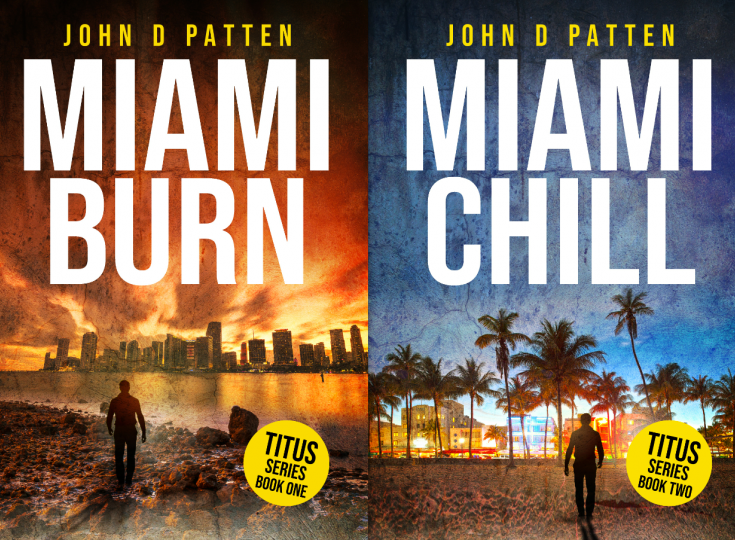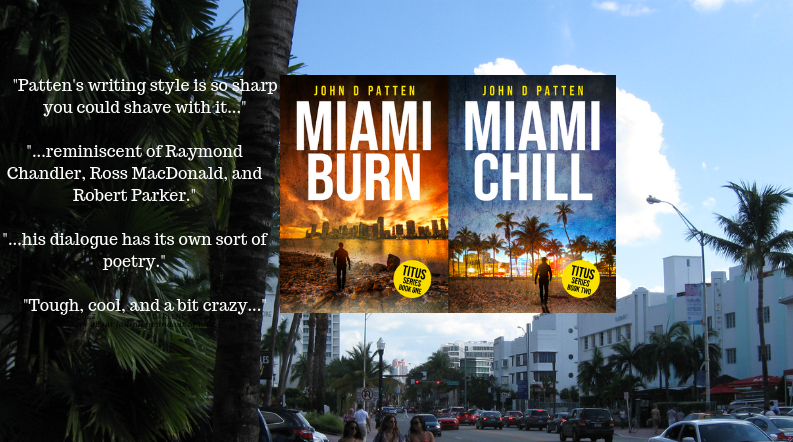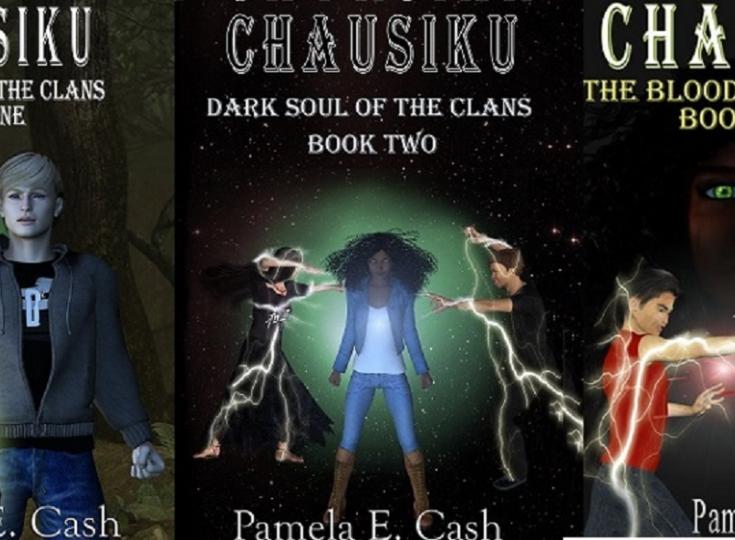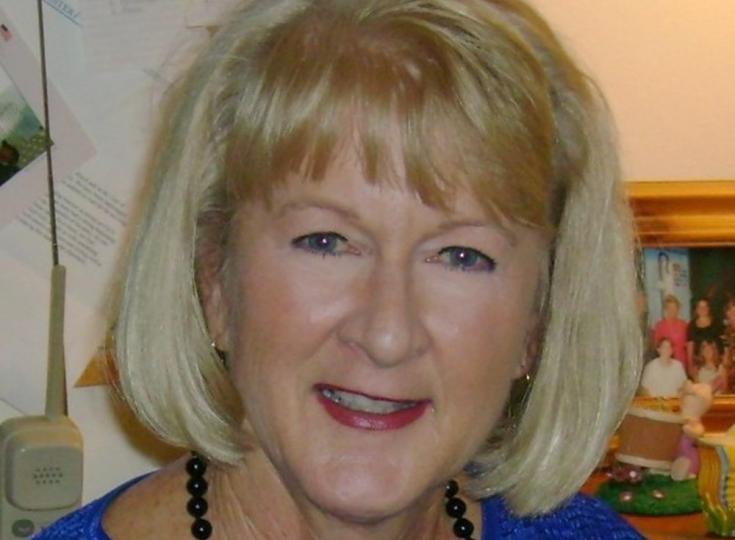John D. Patten - Riveting Detective Noir Thrillers

John D. Patten occasionally skipped class because he was glued to a Spenser mystery by Robert B. Parker. He would be late for jobs because he got caught up in a Travis McGee adventure by John D. MacDonald. He memorized sarcastic Philip Marlowe lines from detective stories by Raymond Chandler. Now, after all these years, he's finally figured out maybe he should be writing hard-boiled thrillers of his own. As our Author of the Day, Patten tells us all about his latest novel, Miami Burn.
Please give us a short introduction to what Miami Burn is about.
It’s the first in a (hopefully) long series about Titus, a modern-day “knight errant” who doesn’t quite have his own act together but ends up helping people who have been the victims of crimes. Kind of like a private investigator, but more of a “fists-for-hire” type who knows how to fight. Simultaneously, he also seems to get caught up in higher-level adventures involving government agencies and international criminals.
“Miami Burn” introduces Titus as an edgy, vengeance-obsessed man on edge. A former cop who spent a year in prison for a crime he didn’t commit, Titus heads to Miami once he is released. He blames a “blond man” who lives in a millionaire’s mansion in Miami for the murder of his pregnant fiancée and has come here to kill him.
But, Hamlet-like, Titus can’t seem to pull the trigger. He knows where the man lives. All he needs to do is walk over and “Bang!” But he can’t seem to do it. Instead, he takes a job as a bartender and philosophizes while living in a dump apartment with no air conditioning—which, if you’ve never been to Miami in summer, is like being trapped over a pot of boiling water.
Into his strange new life walks a rich woman whose college-age daughter has gone missing. Strangely, she has been directed to Titus as a tough-guy who might be able to dive into the sleazy South Beach club scene where her daughter liked to party.
Through finding the girl, Titus rediscovers his own humanity and moral code—with a little help from his friends.

What inspired you to write about a girl who vanished into the South Beach club scene?
It was a combination of ideas. In the first version of the story, Titus was going to be much more of a career criminal who came to Miami and “came over” to the side of the good. A missing girl... possibly being preyed upon by some sleazy manipulators... seemed to be something that might trigger his more noble instincts. The idea was he would save her, discover he liked helping people, and his good instincts would begin to develop from there.
The second inspiration I had for a missing girl who fell into a sleazy life was Robert B. Parker’s classic Spenser novel “Ceremony.” Parker wrote three Spenser novels featuring April Kyle, rich suburban teenager turned prostitute. “Ceremony” was the first one. But I wanted to twist the story around. Allie Hayes, the girl in my book “Miami Burn” who has vanished from her rich parents’ care, turns out to be fully in control of where she went... and likes it. Hope I’m not giving too much away there, but I don’t think so. I wanted Titus (and the reader) to reel back a bit when upon discovering that she wasn’t being manipulated by a bunch of sleazy men after all. In fact, she was the one doing the manipulating.
In the first draft of “Miami Burn,” she had an army of guys she had hypnotized into doing her bidding including a sad case named “Waz” Waztowski. But as I continued writing, it seemed silly so I ditched Waz and Allie’s “Doctor Evil”-like persona and tried to figure out what she was really up to. One day on a long walk, it hit me. Pow!
Also, as I began writing, I realized I had to make Titus a good guy from the start. Yes, he spent time in prison—but I made sure it was because he was falsely accused and completely innocent. I did keep his slightly unhinged behavior, though. It just didn’t feel right to me for some reason to have him be a bad guy. It doesn’t fit the Marlowe-Spenser-McGee mold. Yeah, sure, it may have been more epic to trace how a bad guy becomes good, but whatever. Maybe I’ll do that in another series sometime, maybe not.
Why did you decide do become a writer? And was there a single, defining moment when you realized that you have reached this goal?
I always knew I was a writer. I was writing movie scripts when I was twelve. I’d have my friends over and we’d shoot them on Super 8mm film. I wrote fiction for my high school newspaper and wrote a few student films at Boston University, where I got a degree in film.
Then I lost all my confidence. The world is a harsh place and I sank into a morass of jobs that didn’t suit me. Some were fun, others sucked, some were great fodder for writing books.
Five years ago, I sat down and wrote a few short stories. I showed them to some people and the feedback was overwhelmingly positive. Amazon’s Kindle Direct Publishing operation has opened up a truly open space for anyone who wants to write and I decided to give it a go, bypassing the traditional “collect-fifty-thousand-rejection-letters-before-getting-published-by-some-jackass-in-a-plush-New-York-office-who-gets-to-decide-if-your-stuff-is-good-or-not procedure. That was how it used to be done. Now, you publish and people buy it or they don’t. If you’re good, you make money. If you suck, you die. It’s truly an egalitarian marketplace—although you do have to do your own marketing, which is fine by me.
So I decided to go for it and thus “Miami Burn” was born. The idea had festered in my head for a long time. I wanted to write a series like my heroes Robert B. Parker (Spenser) and John D. MacDonald (Travis McGee). At about this time, I saw the 2006 movie version of “Miami Vice.” I was never a big fan of the original series, but Colin Farrell’s broody on-the-edge-of-insanity performance struck me as a character I’d like to turn into a series hero. That was when I sat down and wrote the first draft of “Neon Girl,” which was the original title of “Miami Burn.”
Why detective noir thrillers? What drew you to this genre?
It was all I read as a teenager and through my twenties. I started with Ian Fleming because I was a big James Bond fan. Then, while in college in Boston in the 1980s, there was a TV series shooting there starring Robert Urich as Spenser, tough-talking private investigator who is good with his fists. When I discovered the series was based on a series of novels written by Robert B. Parker (who coincidentally lived within walking distance of my house), I read them all while skipping classes and walking around Boston to the locations of the scenes in the books. Yeah, that got me on academic probation my very first semester at BU real quick. I toned it down after that, but got hooked on the tough-guy private eye type character.
Then, in my twenties, I discovered Travis McGee, the Fort Lauderdale beach bum of twenty-one novels by John D. MacDonald and fell in love with those... mainly because I pined to be in a hot climate while shoveling snow out of my Boston driveway.
It wasn’t until much later I discovered that both these guys—Parker and MacDonald—had based their craft on the “hard-boiled” or “noir” writing style of the pulp magazine writers of the 1920s and 1930s... writers such as Dashiell Hammett, Raymond Chandler, and Mickey Spillane. Chandler was the one whose writing really spoke to me, though. His Philip Marlowe was obviously the model for Spenser and Travis McGee, even though each character had different personal traits. Reading the Marlowe books made me realize I MUST do this. They are the “créme-de-la-créme” of hard-boiled detective novels, in my opinion and the opinions of a few million readers. I mean, Chandler’s last book was published sixty years ago and they still sell. Amazing.
Titus is just another in the long line of Marlowe imitations. Spenser was tougher and more upbeat. McGee fell in love too hard and too often. Titus is unhinged, torn apart by the death of his fiancée and unborn child, a screw gone loose in his head. He comes to Miami full of rage and vengeance, but soon finds redemption when he begins helping people.
As a young man, I was drawn to this genre probably for the same reason most young men are. Most of us live drab dreary lives and like to read adventures of tough men who solve crimes, date beautiful women, and save the day. James Bond, Spenser, Marlowe, Sam Spade, Lew Archer, Mitch Rapp... guys love them because we all secretly want to BE them... even though most of us would crap our pants if we had to do what those guys do.
Readers have compared your work with that of Spenser and Lee Child. Who are your favorite authors and why?
Besides Parker and MacDonald, I enjoy Carl Hiaasen’s satiric take on the nutty antics of South Florida, Elmore Leonard’s hilariously foul-mouthed criminals, and Vince Flynn’s taut espionage thrillers.
Besides writing, what other secret skills do you have?
I make a delicious sweet Italian sausage pasta sauce, I can perform the entire “to be or not to be” speech from “Hamlet” at a moment’s notice (to the extreme annoyance of people near me), and I can put away Guinness faster than anyone I know.
Why did you pick Miami as the backdrop for your book?
I took a vacation to Miami about five years ago right after seeing the 2006 “Miami Vice” movie. That cemented it. I walked the streets of South Beach thinking, “This is where I want to set my fish-out-of-water hero.” I write Titus as an outsider because I’m an outsider. Being from the tough streets of Boston, Titus finds Miami to be a very strange place. This adds plenty of room for comedic touches.
Readers say that your characters feel relatable and real. How did you pull this off?
I don’t know. I guess I have a good ear for dialogue. Plus, my characters become real to me as I write them. Titus has a very distinct voice, completely different than other series main characters. I know what he would say and what he wouldn’t say. Titus’ best friend, who he meets for the first time in “Miami Burn”, is the Reverend Luther Williams of the Apostolic Rescue Mission Church of Miami Beach, who is also a very tough ex-con. Luther speaks in his own unique voice. His comments in any given situation are unique and fall out of the character I envisioned. Titus’ other frenemy is Detective-Sergeant Sofia DeJesus-Montero of the Miami-Dade Police Department, Organized Crime Section. Again, a completely different voice. She is quiet and brooding right up to when she explodes with anger, which she comically does twice in the book. She and Luther don’t get along, which adds some comic tension.
What's an aspect of being a writer that you didn't know about going in?
How freakin’ hard it is. Seriously. And it doesn’t get easier. It only gets harder. I shouldn’t say that. I don’t believe in whining, and yet here I whine. But seriously, writing a novel is a monumental freakshow of difficulty. Writing another one is worse. Writing another one after that is an exercise in masochism. And yet, I love it. There is a dark joy in putting one’s self through this much misery, especially when it’s done. I’m a big fan of done. I’m not done a lot, but when I’m done... I’m a happy man!
Do you work to an outline or plot or do you prefer to just see where an idea takes you?
Yes, I do outlines. [Insert raucous laughter here.] No, seriously, I can’t outline to save my life. Everybody says you need to outline. Oh yeah? Well, everybody can go jump in a bowl of Jell-O. I tried outlining. Every time I tried it, I ended up writing a book that looks nothing like the original. I need to let the story take me where it wants to go. I forget who said it... “the story is already written, I just translate it.” So yeah, outlining works great for most people. Fine, great for them. But outlining is a huge waste of time for me.
For example, there is a major twist in “Miami Burn.” You’ll know it when you get to it and it turns the book on its head. Here’s the thing... it turned ME on its head because it came to me on a walk after the first half of the book was written. I discovered the truth at about the same moment Titus and the reader does. Personally, I think that makes it that much more powerful. The reader feels the shock because even the author didn’t know that was coming.
What was your greatest challenge when writing this book?
Not going into cardiac arrest. Like I said, writing is hell... but I wouldn’t want it any other way. Nor would I want to do anything else.
You can’t feel the joy of winning a battle if there isn’t one.
Do you consider yourself a disciplined writer? Do you have a schedule that you stick to, or is it more in the moment?
Disciplined? Hahahahahaha. No. I’ve heard of discipline. I have books and videos on discipline. Do I ever put it into practice? No. I’m one of those people who is horribly inconsistent from day to day. Tuesday I’m on top of the world. Wednesday I’m in a gray fog. For some reason, I never get the warning which day is going to be which. All I can do is wake up hopeful. Some days I can’t write at all. Other days I can’t stop writing. Ideas hit me at three in the morning sometimes and I have to get up to jot them down. Fickle the muse is.
What are you working on right now?
A bottle of Canadian Club... oh, you mean writing? I’m halfway through “Miami Storm,” Book 3 in the Titus series. (I’ve been halfway through it since September... but there is a release date coming soon.)
Where can our readers get a copy of Miami Burn?
A new little site called Amazon.com. Here is a link: https://www.amazon.com/dp/B0768XSLCW
If you want to be notified when the next Titus book is coming out, my mailing list is at: https://johndpatten.com
Thank you so much for this interview. It has been an honor and a pleasure to be your guest. I’m a big fan of ManyBooks. Everyone should get on your list now. Your book selections are incredible!





